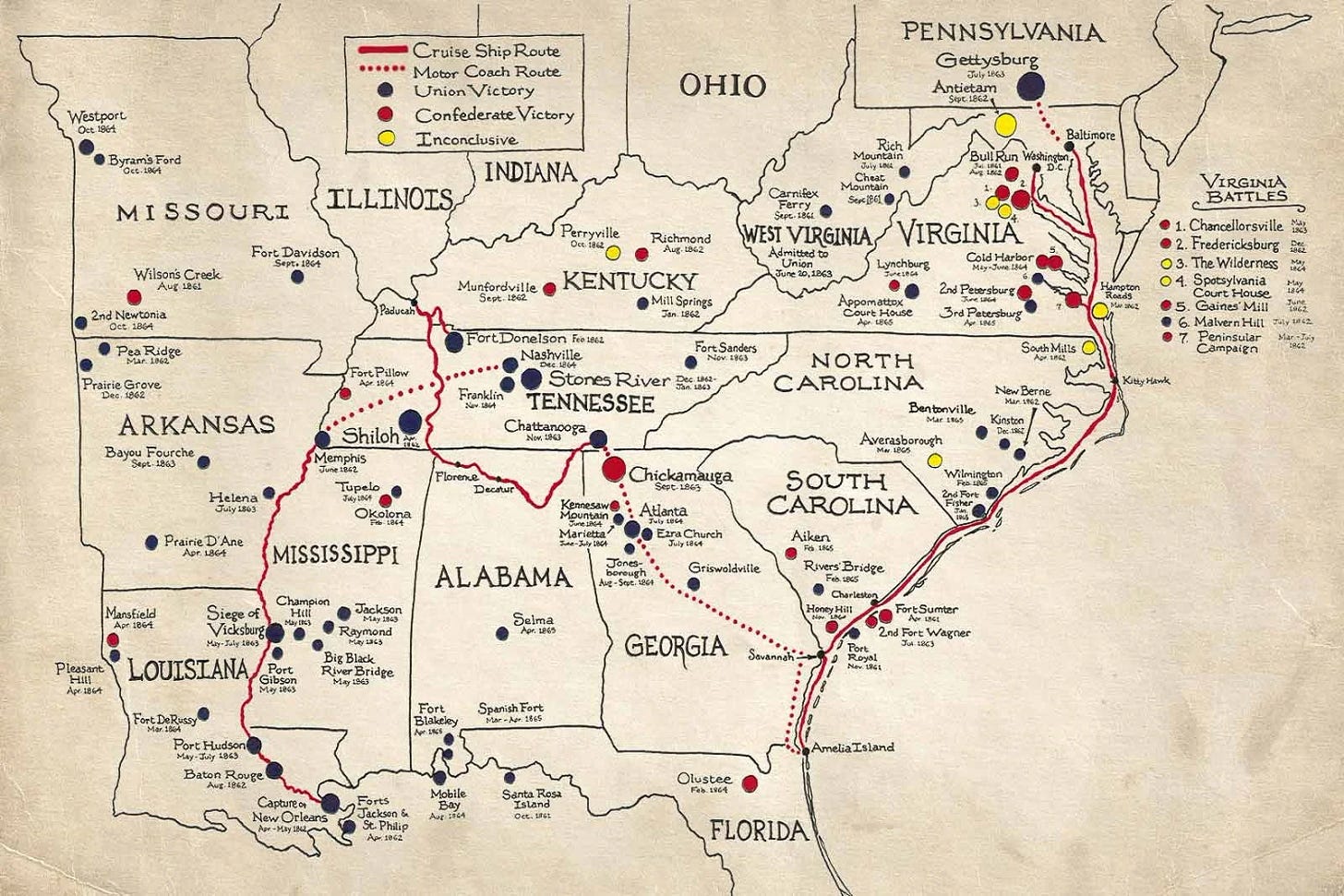News
I can’t decide if a 34-day tour of Civil War battlefields sounds like the ultimate in battlefield tours or a horrible nightmare.
On May 4, 2024, passengers will set sail from New Orleans on the line's Civil War Battlefields Cruise, a 34-day sailing that winds along the Mississippi, Tennessee and Potomac rivers; the Intracoastal Waterway; and the Chesapeake Bay.
Along the way, the itinerary includes calls on destinations in Mississippi, Tennessee, Kentucky, Alabama, Georgia, Florida, South Carolina, North Carolina, Virginia, Maryland and Washington, D.C., before ending on June 6, 2024, in Gettysburg, Pennsylvania. Stops offer a chance to visit key locations such as Fort Sumter, Antietam National Battlefield and Bull Run.
The only guide mentioned is Bertram Hayes-Davis, the great-great-grandson of Confederate president Jefferson Davis.
I think I’ll pass.
This week Fort Bragg in North Carolina was renamed Fort Liberty. It’s one thing to name a military base after a Confederate general, but historians point to Braxton Bragg as one of the worst.
Here is an interesting story about Robert Blake, a former slave from South Carolina, who joined the United States Navy and was awarded the Medal of Honor in 1864.
I’ve always found the military service of two of Paul Revere’s grandsons to be worth closer study. Here is an interesting profile piece of Paul and Edward from The Boston Globe.
The Revere brothers volunteered in the early days of the war, serving together in the 20th Massachusetts Volunteer Infantry, the so-called Harvard Regiment, leaving behind young families. Paul had graduated from Harvard and entered as a major. Edward joined as an assistant surgeon with a degree from Harvard Medical School.
Danger found them quickly, and both were taken prisoner in October 1861 during a Confederate victory at Ball’s Bluff, Va., where Paul suffered a minor wound. They were released about six months later, rejoined their regiment after a few months in Massachusetts, and served with their comrades at the Battle of Antietam in September 1862, the deadliest one-day battle in American history.
Paul was wounded again, this time in the arm, and stayed on the battlefield for hours before finally leaving the fight. He asked about his brother’s safety, was told that Edward was well, and made his way back to Boston to convalesce.
But the news from the battlefield had been mistaken. Edward, 35, died instantly after being shot in the head while dressing a wounded soldier’s leg near the front lines.
Promoted to colonel, Paul returned to the regiment in April 1863. A letter written to his wife, Lucretia, showed the strong, conflicting emotions that pulled at the 30-year-old father of two small children, ages 3 and 1.
“My dearest wife, our relationship to each other was perhaps never so near, certainly never nearer, than during the last days of our being together,” Revere wrote in May 1863. “My feelings at leaving our dear children would, I am afraid, have proved too strong for my sense of duty had I remained much longer with them, dear little hearts.”
Several weeks later, Revere noted in a letter home that the regiment had marched to the rear of a small Pennsylvania town called Gettysburg.
Historian Charles Dew questions Florida governor Ron DeSantis’s understanding of the cause of the Civil War.
Alabama Commissioner Stephen F. Hale wrote a public letter to the governor of Kentucky on December 27, 1860, carrying a similar message. The election of Abraham Lincoln to the presidency in November 1860 was nothing less than “an open declaration of war” on the white people of the South. And “the triumph of this new theory of government destroys the property of the South, lays waste her fields and inaugurates all the horrors of a San Domingo servile insurrection, consigning her citizens to assassinations and her wives and daughters to pollution and violation to gratify the lust of half-civilized Africans.”
These same words and sentiments occurred over and over again in the commissioners’ messages. And it seems to me that we deserve a president who is aware of this history, who is awake to the realities of our racist past. It just might help him or her govern in the interest of all of our citizens, not just those who want “woke to die.”
Videos
Here is historian David Blight talking about what is likely the first public celebration of Memorial Day by formerly enslaved people in Charleston
Will Greene attempts to outline the Petersburg Campaign in four minutes.
I am very much looking forward to visiting the “Gettysburg Beyond the Battle Museum” next week. Here is a short interview with Jake Boritt and museum director Andrew Dalton.
New to the Civil War Memory Library
Martha Hodes, My Hijacking: A Personal History of Forgetting and Remembering (Harper, 2023).
Joseph McGill Jr., Sleeping with the Ancestors: How I Followed the Footprints of Slavery (Hachette, 2023).






Lots of interesting items here, but I’m always riveted by any mention of Ball’s Bluff. Morgan’s “A Little Short of Boats” is an excellent account of the battle, but nothing - nothing - substitutes for a visit to this particular site, where topography determined everything. Walking the steep cliff that plunges to the river always evokes in me a hint of the sense of panic and despair that the Union soldiers felt as they were driven to the edge. And then a visit to the tiny cemetery reminds you of the many personal losses that Lincoln suffered during the war - Edward Baker, after whom the Lincolns’ son Eddie was named, is one of a handful of men buried there.
Congrats to Fort Liberty. To quote To Kill a Mockingbird, "Atticus said that naming people after Confederate generals tended to create a lot of slow, steady drinkers."
Otis has a really sweet smile.